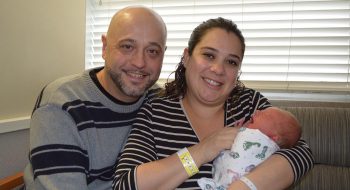You might think dancing would catch hospital nurses by surprise, but registered nurse Sarah Wideman says pregnant women choose many different ways to pass time until delivery.
“Whatever moms feel comfortable doing, the nurses support,” says Wideman, who works in labor and delivery at Tidelands Waccamaw Community Hospital. “We have mothers who like to dance and moms who want the room to be quiet and calm.
Other mothers take advantage of Tidelands Waccamaw’s hydrotherapy tub, a deep soaking tub that can help relieve pain and allows moms to experience buoyancy and freedom of movement as they progress through labor.
Some couples use their phones or watch movies, Wideman says.
Try to stay occupied
Whatever a mom’s preference, it’s a good idea to have some activities handy to help the time pass by, Wideman says.
Labor can take longer than 18 hours for some first-time moms, Wideman says, and those who have epidurals can’t get out of bed.
Wideman recommends moms-to-be participate in birthing classes at Tidelands Health. The classes teach expecting parents the stages of labor, postpartum care, breastfeeding and what to expect during and after the hospital stay.
The class includes help on packing a labor bag. The hospital provides diapers, blankets, and wipes, but nurses recommend bringing favorite lotions, books and games to pass the time.
Gradually, by the time labor intensifies, even footloose moms-to-be will need all of their puff just to breathe through the contractions.
When labor starts, the hormone oxytocin is stimulated to cause contractions in the uterus. The contractions push the baby down into the birth canal, causing pressure on the cervix to help with dilation.
Every delivery is different, but a woman’s body typically tells her when it’s time to start pushing, Wideman says.
Staying together
The health system’s labor and delivery team encourages skin-to-skin contact with mother and baby for the first hour after birth, she says. The contact helps to regulate the baby’s vital signs and promotes bonding, she says.
During that hour, the nurse will assist the mother with the first feed. Tidelands Health also teaches breastfeeding and encourages “rooming in,” so the baby stays in the room with the mother.
The strong lactation support offered by the health system is one of the reasons Tidelands Waccamaw has earned the prestigious Baby-Friendly designation, which recognizes hospitals and birthing centers that offer optimal care for mothers and their babies.
Babies cry less when they’re with their families, and it helps mom and dad get to know the baby’s feeding cues and helps with bonding, Wideman says. Mother and child sleep better when they’re together.
Women who have vaginal deliveries typically spend two nights at the hospital, while C-section moms typically spend three nights.





